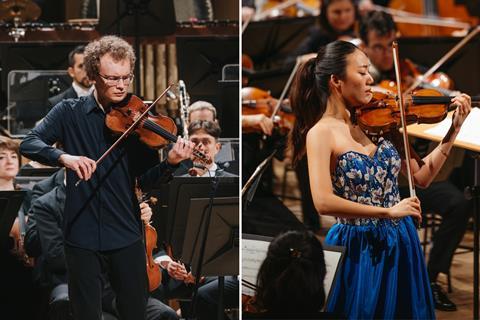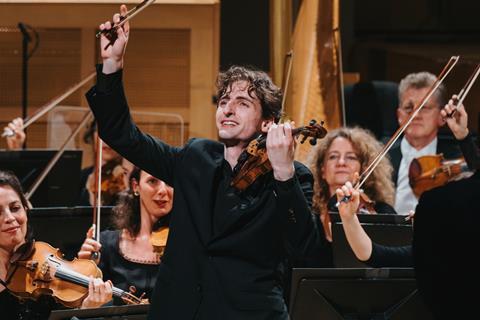The 2024 Queen Elisabeth Competition confirmed that the standards and the stakes are higher than ever. Melissa Lesnie reports from one of the most influential string events on the international circuit

Discover more Featured Stories like this in The Strad Playing Hub.
Read more premium content for subscribers here
Most travellers head to the Belgian capital to gorge on waffles and frites or to smirk at a peeing statue. Brussels also boasts a major draw for music aficionados; every year in May, the area around the Centre for Fine Arts hums with excitement as the international classical community tunes into the Queen Elisabeth Competition, which cycles year by year through violin, piano, cello and voice. The anticipation builds up over the six nights of orchestral finals: televised and live-streamed from every angle.
This time it was the turn of the violinists, and if few of the finalists (all under 26 for 2024) were prepared for the media onslaught, most were already seasoned competitors; however, there was also the added pressure of playing for royalty, with the competition patron Queen Mathilde of Belgium and other members of the royal family peering out from the gilded box night after night.
Those who attended the finals (27 May–1 June) witnessed twelve different renditions (each with an entirely fresh perspective) of the ‘imposed’ work, a competition commission from French composer and organist Thierry Escaich, Variations litaniques. They were also treated to repeated hearings of the candidates’ chosen concertos (from either the 19th or 20th century). Shostakovich’s haunting First Violin Concerto dominated, with a third of the participants choosing the work originally premiered by David Oistrakh, laureate of the inaugural Queen Elisabeth Competition in 1937. It’s curious that so many opted for the heart-wrenching despair of a tormented composer over the trills and frills of a Romantic crowd-pleaser. The Brahms Concerto was tackled by three finalists, Tchaikovsky and Elgar were aired twice, and Sibelius was heard only once.
The Queen Elisabeth Competition is revered as one of the most consequential events for elite string players in this age bracket. In addition to substantial cash prizes for the finalists, the winner gets to take home the 1708 ‘Huggins’ Stradivari violin on four-year loan, thanks to the Nippon Music Foundation.
It may also be one of the most gruelling. The candidates are whittled down from 290 video submissions to 12 finalists, each of whom presents a programme (two per night) as soloist with the Belgian National Orchestra conducted by Antony Hermus. The ‘imposed’ piece is revealed to the finalists only as they are placed in mandatory seclusion at the Queen Elisabeth Music Chapel in Waterloo, a short distance south of Brussels. They have only a week to prepare it, unaided by external influences or precedents.
At the vast Henry Le Boeuf concert hall, with its understated art nouveau details and impressive backdrop of gold organ pipes, there was a palpable sense of occasion for the first night of finals. I spotted Mischa Maisky as well as the ‘influencer’ contingent, TwoSet Violin. Brett Yang and Eddy Chen told me that participating in such a competition was a ‘dream’ during their Queensland Conservatorium days.
We applauded the solemn entry of the jury – which included several competition alumni: Tatiana Samouil, Kyung Sun Lee, Lorenzo Gatto and Vadim Repin. Then we stood again to applaud the arrival of the royal party.
Elli Choi had a direct and fearless tone plumbing the emotional depths of Shostakovich without histrionics
It fell to the youngest competitor Hana Chang (b.2002), from the US, to give the world premiere of Variations litaniques. The sound from her 1647 Nicolò Amati was engulfed by the churning orchestral texture and she approached the syncopated double-stopped passages timidly, though with a sense of filigree detail that served her well in Tchaikovsky.
Next, Korean Dayoon You (b.2001) brought a more sinuous, muscular sound to the work, with vivid intensity in the attack, making for lively dialogue with the orchestra. The Elgar that followed was an epic, powerful tour de force through a range of emotions; at the end of the 50-minute concerto I had the impression I’d lived through an intense experience with the soloist.
The second night offered a direct comparison of two performances of the Brahms Concerto. Karen Su (b.1998), from the US, pushed hastily through the opening movement, lacking coordination with the orchestra at key moments, whereas Kazakhstan-born Ruslan Talas (b.1998), a protégé of Janine Jansen, leaned into Hungarian folk elements of the same for a charming twist to the phrasing of that rustic theme. From the radiant and assured Brahms cadenza to his nimble, edgy Variations litaniques, his performances were executed with a relaxed demeanour, and even the occasional hint of a smile.
On 29 May, the initially cautious introduction to the Variations litaniques from Korean Anna Im (b.1997) bloomed to reveal incisive intonation and a sweet timbre, though she was weighed down by overwrought technical elements.
US-based Elli Choi (b.2001) coaxed a taut, clear and bright timbre from her 1706 Stradivari, particularly in the dialogue between solo violin and concertmaster in Escaich’s work. Choi had a direct and fearless tone, plumbing the emotional depths of Shostakovich without histrionics, and this resulted in a spectacular standing ovation (and ultimately the third prize).

On Thursday, SongHa Choi (b.2000), a Yehudi Menuhin School graduate from Korea, dazzled with her stage presence in one of the most suave interpretations of the Variations litaniques – angular yet flowing, and she genuinely seemed to enjoy herself. Statuesque in her floor-length, glittering gown, she paused to wipe sweat from her hands before launching into her own deeply intense and personal reading of Shostakovich, which was full of resignation and tragedy compared with Elli Choi’s gusto and biting sarcasm. SongHa Choi was also the only candidate to choose a modern instrument: a 2005 Stefan-Peter Greiner.
Then came the most strikingly different interpretation of the Escaich, from Julian Rhee (US, b.2000). Dapper in his suit and red-framed glasses, he seemed too engrossed in idiosyncratic details to engage with the arc of the work, leaving little contrast in the slow, static gossamer section. Similarly, the phrasing in his Tchaikovsky was so mannered that the balletic melodies didn’t seem to dance, leading to substantial timing and coordination issues with the orchestra in the finale. And if I feel stressed listening to Tchaikovsky, something’s wrong.
I could go on, but I should also mention that all the rounds can be watched online. As is often the case in competitions, the jury’s decisions had little in common with the reactions of the public, and I was disappointed that only one of my four personal favourites, Elli Choi, broke into the top six. She came third, receiving €17,000. With the last two candidates – Ukrainian Dmytro Udovychenko and American Joshua Brown (both b.1999) – placed first and second (receiving €25,000 and €20,000 respectively), one can’t help but wonder if playing one of the last available slots gives more preparation time, without succumbing to frustration.
Frustration certainly lingered in the air on the final night, none more so than when Udovychenko, whose family is in Ukraine, declined to shake the hand of Russian jury member Repin. Those who noted that Udovychenko chose a work by a Russian composer are missing the point. But these few seconds of controversy, whether or not misplaced, only briefly blighted the power and intensity of experiencing the finalists’ journeys.
Read: Dmytro Udovychenko wins the 2024 Queen Elisabeth Violin Competition
Read: Contending for the crown: Postcard from the 2022 Queen Elisabeth Competition
Discover more Featured Stories like this in The Strad Playing Hub.
Read more premium content for subscribers here
The number one source for playing and teaching books, guides, CDs, calendars and back issues of the magazine.
In The Best of Technique you’ll discover the top playing tips of the world’s leading string players and teachers. It’s packed full of exercises for students, plus examples from the standard repertoire to show you how to integrate the technique into your playing.
The Strad’s Masterclass series brings together the finest string players with some of the greatest string works ever written. Always one of our most popular sections, Masterclass has been an invaluable aid to aspiring soloists, chamber musicians and string teachers since the 1990s.
American collector David L. Fulton amassed one of the 20th century’s finest collections of stringed instruments. This year’s calendar pays tribute to some of these priceless treasures, including Yehudi Menuhin’s celebrated ‘Lord Wilton’ Guarneri, the Carlo Bergonzi once played by Fritz Kreisler, and four instruments by Antonio Stradivari.


































![[1st prize] Poiesis Quartet in round 3 (2)](https://dnan0fzjxntrj.cloudfront.net/Pictures/100x67/1/9/5/41195_1stprizepoiesisquartetinround32_547631.jpg)










No comments yet